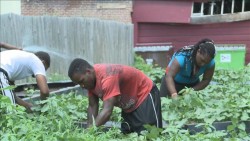The Sweet Potato Project was created as a way to empower youth in North Saint Louis by providing them with economic opportunities; students, ranging in age from 15-21, grow sweet potatoes in an urban landscape, which they then harvest and turn into products. The kids in the program then market and sell the products. The students earn an hourly wage alongside the valuable life and professional experience they learn through the program.
Sylvester Brown, self described “pot-stirrer” and lifelong activist, spearheaded The Sweet Potato Project to help minority youth break the cycle of poverty in the under-served North Side. He became interested in Urban Farming as a way to help under-served communities after reading Muhammad Yunis’ “Creating a World Without Poverty,” which describes how microloans can help the poor to become resilient. Brown says that, “the book had a profound impact on me but I didn’t think it was possible in the US. However, when Obama went into office in 2009, he started a bunch of community development initiatives like the Federal Food Financing Initiative aimed at revitalizing urban communities.”
“I was fired from the Post-Dispatch that year and went to work for Tavis Smiley’s book company. Working on books [published by the company] convinced me that African Americans can’t just sit around and complain, we have to do something to change our destinies, create opportunities for our youth and create sustainable economic engines in inner cities,” Brown explains. “Thus was the seeds of the Sweet Potato Project.”

In addition to helping individuals thrive, The Sweet Potato Project helps lift up the whole community; planting gardens in their own neighborhoods grants participants a sense of place and ownership. As Brown explains, “giving students the tools to become entrepreneurs is cool – but it’s not enough. We need to build environments for their success. The big picture is to create an all-around food hub where our students and adult residents in low-income areas own vacant land, grow food and make food-based products together and then find creative ways to bring that food to market. Once enough folk have land in designated areas, we envision spin-off businesses and companies in North St. Louis. This is a way to empower students and bring self-sufficient enterprises back to hard hit areas of the city. Currently, we work with three community gardens. Starting in 2016, we will buy our own land, build a small farmers market in the Ville area and work with community groups and residents to get land through city auctions and the Land Reutilization Authority.”
“In brief, we’re taking these savvy, resilient youth, born into dire environments and show them how they can reclaim and revitalize their own neighborhoods while making money at the same time,” Brown says. “We get them to focus on the economics of urban areas; what people wear, eat, what they drive and where they shop. The idea is to get them to adopt a sense of entrepreneurism and self-sufficiency that will serve them in any area they travel; be it academia, the corporate world or as entrepreneurs.”
Manufacturing jobs have largely left the North Side, leaving families without the funds to afford college for their kids and perpetuating intergenerational poverty. This is why revitalization of the built environment is so important. As Brown says, “the demand for hands-on, decent-wage, low education jobs, has basically dried up. In our opinion, the locally-grown food movement is a wonderful and empowering opportunity to bring jobs and small business growth, and people with an economically-vested interest back to inner cities. However, we have to approach it as an economic engine with spin-off benefits. Everybody eats. It would be wonderful and lucrative if food grown in the inner-city by low-income residents fueled public schools, public institutions, grocers, corporations and homes.”
The potatoes are currently being baked into cookies under the supervision of Saint Louis University’s department of Food and Dietetics. After the cookies are perfected, The Sweet Potato Project plans to branch out into brownies, potato chips, and sweet potato butter. Brown is currently looking “for a manufacturing company to adopt our program and help us deliver a quality packaged product on a consistent basis. In brief, it’s a work in progress. We should be ready for increased sales of quality products by January 2016.”
The Sweet Potato Project is a blossoming organization, creatively attacking the problems of poverty and food in Saint Louis’s lovely North Side. As Brown says, “the goal is to grow and sell together.”



